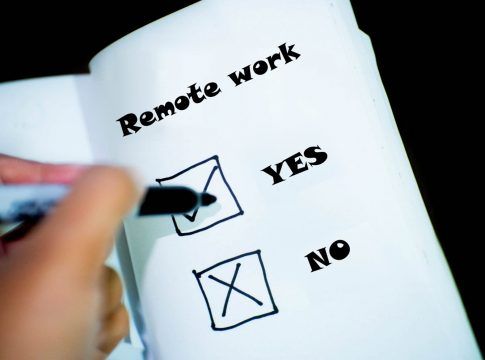The novel coronavirus (codiv-19) outbreak has put several countries on lockdown, the President yesterday came out and announced that schools, churches, bars and big gatherings have been temporarily closed schools for 32 days. All in the name of ensuring once the virus comes to Uganda, it can be contained. But, what about work places? Its true we have to ensure a high sense of hygiene, but some companies worldwide can’t risk it and have prompted business leaders everywhere to tell employees to take their laptops home and suddenly turn the company remote.
Such companies in Uganda will now join what Time calls “the World’s Largest Work-From-Home Experiment,” but without the preparation other companies have had. I have to admit, after over 7 years of working remotely as a manager while in Uganda, companies and their employees will have some hard time to adjust. If your company is one of them — or you think it will be — this is what I recommend for managing remote workers in Uganda.
Individualization is Paramount:
The best managers have always individualized their coaching to the worker, but doing so at a distance requires greater intentionality. Managers need to ask each team member to describe the conditions under which they perform best, their concerns about their workflow and their emotional response to the situation.
Managers in strengths-based businesses have a huge asset — they can predict employees’ reactions. Whether that means a driving need to complete projects, keep promises, maintain relationships or any other motivator, those traits are powerful … and different for everyone. Managers will need to individualize to the person to get the best performance. A one-size-fits-all response never fits anyone very well.
Clear expectations must be set early:
To be honest the concept of remote work is Alien to most Ugandans and many employees — remote or not — don’t know what’s expected of them at work. That’s a bad beginning, and it’ll get worse for employees sent home without good guidance. So managers must make expectations crystal clear:A is the work you should do, B is the quality standard, C is the deadline. Executives should provide higher-level expectations aligned with the company’s purpose: We’ll keep our customers engaged by doing A, we’ll maintain our standards by doing B, we’ll fulfill our mission by doing C. The more detail, the better.
But remember, fulfilling expectations requires equipment and information. I have realised that the most successful remote work situations are those in which workers have similar work styles, know and like each other, have technology that allows them to collaborate, and know how to use that technology. You may not have time to create great working relationships — though you should try — but now’s the time to explore your digital options. That’s how people will meet the expectations you set.
ALSO READ: All you need to work remotely from home in Uganda
Communication:
Employees who are accustomed to working in-house may feel cut off from the resources, information or relationships they need to do their jobs well, so plan for more conference calls. It’s OK to pad socializing into the timeframe; indeed, it may be vital for people who need lots of interaction to keep their energy up. Managers will have to be diligent about communicating productively — coaching high performance requires frequent conversations, and there won’t be chance conversations in the hall. But your staff needs to hear from you too, especially as economic fears worsen, to maintain their trust in leadership. Keep the lines of communication open, honest and broad. Send emails or post videos about your reasoning, intentions and expectations. Make it easy for managers to know your thoughts and contribute their own.

Be aware of distractions
Managers should also expect that employees working from home will have several distractions such as Netflix, endless calls resolving small family matters, clear rules should be set on this, if need be set some company rules like creating a slack channel to alert colleagues when you are offline or have to run an errand.
Time tracking apps would help managers monitor employees, although they come with a lot of privacy invasion especially those that take webcam screenshots to prove if an employee is actually at his workstation remotely. You can agree as a company which method works for you but it all comes down to trust.
Support your managers
A sudden change in the practice of management can be hard on managers. They may worry about disruptions to the workflow they’re accountable for. Some may feel they have to be physically present to be good coaches, unsure that they can engage workers from a distance. Rather more negatively, there are still some managers who don’t trust workers they can’t see. All of them will have to manage workers in a new way, and fast.
So give them your support, both practical and emotional, during what may be a tough transition. Invest in management development and coaching ahead of the budget plan, and be affirming about the situation and understanding about altered deadlines. Just remember, your managers always need to know you have their back — but never more so than when they feel insecure.
The future of remote work in Uganda
With less than 1% of Ugandan employees working remotely some or all of the time, and many, many studies show remote workers are more productive and profitable than in-house employees. So don’t worry — telework can succeed spectacularly. Although your company will have to learn quickly, your people may perform at levels that surprise you.
But don’t be surprised if they don’t want to come back to the office.
Worldwide, the number of remote workers is growing by four percentage points — representing millions of employees — between 2012 and 2016, workers are spending more time off-site than ever before, and that more and more industries are putting remote work policies in place (primarily finance, insurance and real estate, followed by transportation, retail, manufacturing and construction). That percentage is about to explode, whether companies are prepared for it or not. So if you have to send people home to keep them safe, individualize, communicate and set expectations so your managers can coach effectively during a crisis. But keep this in mind: While COVID-19 won’t be an issue forever in Uganda or worldwide, remote work will be. What you learn about leading a remote workforce now will likely become best practice for your company later on. I would like to end this article with an interesting quote from Forbes “Remote work is no longer a privilege, It’s become the standard operating mode.”
Does your company plan to go remote? Please leave a comment for us below.


